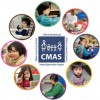Programs and Activities Expert Corner
E-Learning: Trauma-Informed Approaches to Supporting Overwhelmed Children – Available in English and French
Last fall, AMSSA hosted a 1-hour virtual workshop on Trauma-Informed Approaches to Supporting Overwhelmed Children for IRCC-funded early childhood educators in B.C. For those who were unable to attend, the presentation recordings and shared materials are now available. This e-learning module provides practical strategies to better support children in moments of crisis as well as resources to extend your learning (e.g., caregiving for healthy attachment, healing after trauma, and resilience). This e-learning is available in both English and French, and a certificate of completion is available upon completion.Social Emotional Learning Language Tips For Emotional Intelligence
Children experience big emotions daily and need supportive caregivers to help them develop the four quadrants of emotional intelligence to better manage and regulate emotions effectively, work with peers, and empathize with others. This article explains the four quadrants, and provides us with the language we need to support this important development in our CNC programs. This may seem like a lot, but you may be surprised to find that you're already promoting these quadrants and skills in your everyday conversations without even realizing it!Supporting Emergent Bilingual Children in Early Learning: CHECKLIST
Young children’s first learning experiences outside the home often happen in child-care settings, and many children come to school as emergent bilinguals (i.e., children who are exposed to two or more languages, also known as dual language learners). Research shows that learning multiple languages is very beneficial for development, yet few early child-care educators know best practices for supporting the learning of more than one language. This checklist can help us better support children’s bilingual learning in our programs.Intentional Inclusion For Multicultural Classrooms
In this episode of the preschool podcast, HiMama chats with K’Sandra Earle, Associate Director of Early Learning Neighbourhood Collective (ELNC), about how to be intentional about diversity in early learning classrooms. K'Sandra shares tips on empowering teachers and involving parents to create a space that celebrates young children and their unique cultural backgrounds.Loose Parts
Loose Parts presented by Carolyn HadcockSupporting The Settlement Of Young Immigrant Children And Their Families, by Julie Dotsch is now available online!
Written by child care and diversity expert Julie Dotsch, with strategies and ideas from caregivers working in the field of newcomer child care, "Supporting the Settlement of Young Immigrant Children & their Families" builds on caregivers’ professionalism, knowledge and experience to provide a greater understanding of the new immigrant and refugee experience from a child’s and family’s perspective. Leaping the Learning Curve: Five HR Practices that Improve Child Care Administration
Leaping the Learning Curve: Five HR Practices that Improve Child Care Administration
Your role as administrator is one of great responsibility—especially as it involves a program that cares for children. However, the human resource function, which can be a full time career in other industries, is usually just a part of the child care administrator’s workload. Finding the time to get up to speed, not to mention locate child care specific resources, on all the HR aspects of administration can be near impossible. Read More Mentoring for Personal and Professional Growth with Glory Ressler
Mentoring for Personal and Professional Growth with Glory Ressler
Here is the first of four workshops from the 2011 Professional Development Conference for LINC Childminders. Mentoring is a powerful vehicle for personal and professional growth. Glory Ressler, from Mentoring Pairs for Child Care project, facilitates a fun and informative exploration of what mentoring is, and ways to apply mentoring. View the workshop
 Six Reasons to Love Your Job!
Six Reasons to Love Your Job!
If you work with immigrant children,1) You are leading the way in a growing professional field!
Canada welcomes 250,000 immigrants each year, including over 8,000 children and youth, speaking over 80 different languages. You work with these families each and every day. When there is a crisis in another part of the world, and refugee families arrive here in Canada, for many of them, you are their first contact!
Read More

